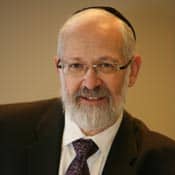 It was an improbable and awkward moment. Sitting across a table at Starbucks, we had never met before. I was visiting his town, and asked for a meeting to discuss issues of common interest. He being a pastor of a large evangelical church and I being an Orthodox Jewish rabbi, I think he came less in the spirit of interfaith dialogue than out of curiosity. Pardon me, Rabbi, but exactly what do an Orthodox Jewish rabbi and an evangelical Christian pastor have in common?
It was an improbable and awkward moment. Sitting across a table at Starbucks, we had never met before. I was visiting his town, and asked for a meeting to discuss issues of common interest. He being a pastor of a large evangelical church and I being an Orthodox Jewish rabbi, I think he came less in the spirit of interfaith dialogue than out of curiosity. Pardon me, Rabbi, but exactly what do an Orthodox Jewish rabbi and an evangelical Christian pastor have in common?
He quickly learned that I wasn't very much interested in interfaith dialogue either. At least not of the old school, in which people would listen to presentations on theological issues and see if they could all meet in the middle. It did not take too long for him to learn that I had no demands on him to modify or moderate his views. Nor would I brook anyone's attempt to get me to compromise on any religious practice or belief. Matters of faith do not lend themselves to negotiation.
He learned, rather, that I had two reasons for wanting to meet. The first was an area of mutual concern that he had not thought of—our common concern for the well-being of the State of Israel.
My second purpose intrigued him: developing ties between our communities on the individual and the communal level. Somewhere in the middle of my pitch, he swallowed hard, and addressed the elephant in the room.
"How do you manage to speak with me so casually, with no tension in your voice? Don't my beliefs offend you? They seem to offend other Jews."
"Not in the slightest," I told him. "I don't stand by my religious beliefs and practices like a fan cheering his or her favorite team. I stand by them because I believe that they are true. If they are true, no one else's belief need have any impact upon me or cause me any consternation. If I know that the sum of interior angles of a triangle always equals 180 degrees, no one's opinion that they really add up to 200 degrees is going to cause me any grief—even if others say that my immortal soul depends upon it. Let people pray that I should see the light, or let them believe that my prayers are not heard. G-d is smart enough to figure out which requests He wishes to honor."
Once he learned that I possessed the same confidence that he did, we were both completely at ease with each other. Moreover, we instantly bonded, because we understood how much we shared despite the irreconcilable theological differences.
Fear mongers spread a lie that the movement in many parts of the world toward strongly held beliefs (e.g., Pentecostalism among Christians) is putting hundreds of millions of people at risk of a new round of holy wars. This does not have to be. Two factors dictate whether different faiths will collide or cooperate.
The first factor is what those faiths preach about "the Other," about people outside of that religion. What they say about who gets to Heaven in the afterlife is not so important in this regard. What is important is how they instruct their adherents to treat others in the here and now. If they preach genuine respect and toleration, based on the recognition of the infinite worth of the Divine imprint on each person, then strong faiths can easily accommodate each other.
That gets us about half way to where we want to be. To get from toleration to cooperation requires that people recognize elements of universality in their faith. Consider this example from the Book of Exodus. Moses, emerging from the Egyptian palace in which he was raised, intervenes on behalf of a fellow Jew, being viciously beaten by an Egyptian taskmaster. As a consequence, Moses has to run for his life. In the very next narrative, he sees a group of women being pushed aside at a well by some stronger men. Again he intervenes and rescues them.
Rabbi Yerucham Levovitz, a great thinker in the early 20th century, argued that the two rescue stories are juxtaposed for an important reason. The first story could be seen as jingoism. Moses, the future leader of the Jews, protects his own. There is nothing dishonorable in that, but it would convey a very wrong notion of what it takes to become the greatest Jewish prophet of all times. Moses was motivated not by loyalty to the in-group, but contempt for injustice. It did not matter where he saw it or whom it victimized. It could be a brother, or a group of Midianite strangers. He would not tolerate injustice and acted on his instinct to pursue justice, even at personal risk. G-d would not choose a lesser person to be His lawgiver.
Pursuit of justice is a value that sharply divergent religions can still share. No matter how deeply they are divided in other areas, when two faiths both believe that righting wrongs is not just a matter of individual conscience, but demanded by G-d, they can turn religious fervor and passion into an asset for the world's citizens, rather than a cause for war.
2/8/2011 5:00:00 AM





